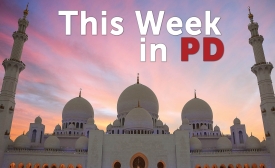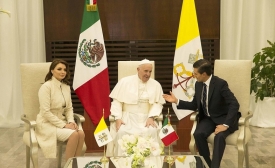religious diplomacy

News this week focused on religion's role in public diplomacy.
Pope Francis arrived in Colombia on Wednesday with a message of unity for a nation deeply divided by a peace deal that ended a five-decade war with Marxist FARC rebels but left many victims of the bloodshed wary of the fraught healing process. Francis, making his 20th foreign trip since becoming pontiff in 2013 and his fifth to his native Latin America, started his visit in Colombian capital Bogota. He will travel later in the week to the cities of Villavicencio, Medellin and Cartagena.
Russian capital will be hosting a new round of Nagorno-Karabakh negotiations. But this time the participants are not the presidents and foreign ministers, nor even the OSCE Minsk Group co-chairs. This time the problem will be addressed by the spiritual leaders of Azerbaijan and Armenia.
With global oil prices flailing, Saudi Arabia is turning to another natural resource: billions of dollars gained from religious tourism as the kingdom hosts the annual hajj pilgrimage. “The money spent by pilgrims this year could be from 20 to 25 billion riyals (5.3 to 6.7 billion dollars),” said Maher Jamal, head of Makkah’s Chamber of Commerce and Industry - an estimated 70 percent increase from the previous year.
Cardinal Pietro Parolin, the Vatican’s secretary of state, has just made a four-day trip to Russia. It was the first time in 19 years that a holder of that powerful office, sometimes described as “prime minister” of the Holy See, had visited Moscow.
The meeting of His Highness Shaikh Mohammad Bin Zayed Al Nahyan, Crown Prince of Abu Dhabi and Deputy Supreme Commander of the UAE Armed Forces, with influential Iraqi Shiite cleric Moqtada Al Sadr is an important step towards reaching out to the leadership in Iraq. It is the second such trip in as many months for Al Sadr, who commands a huge following among Iraq’s urban population.

An exploration of the Catholic Church's faith diplomacy and its impact on international relations.
An increasing number of organizations have in recent years begun to advocate collaboration with religious leaders in order to resolve conflicts. Former French foreign minister Jean-Marc Ayrault and the Sant’Egidio community signed an unusual agreement on April 18. The convention explicitly recognized their “long-term collaboration” in various fields including interreligious dialogue, conflict prevention and the hosting of refugees.







